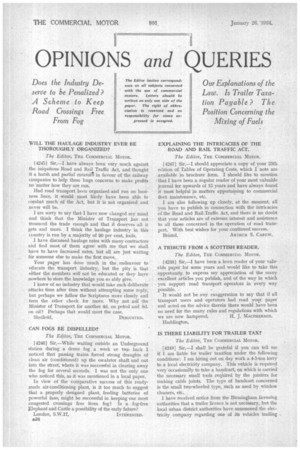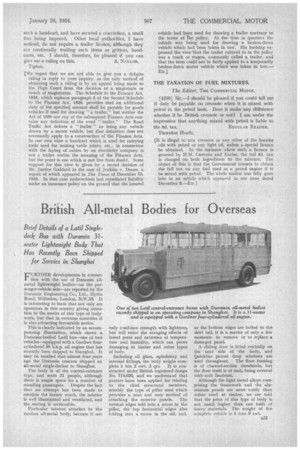OPINIONS and
Page 46

Page 47

If you've noticed an error in this article please click here to report it so we can fix it.
UERIES
142451 Sir,—I have always been very much against the iniquitous Road and Rail Traffic Act, and thought it a harsh and partial measure in favour of the railway companies to help these huge concerns to make profits no 'matter how they are run.
Had road transport been organized and run on business lines, it would most likely have been able to combat much of the Act, but it is not organized and never will be.
I am sorry to say that I have now changed my mind and think that the Minister of Transport has not trounced the trade enough and that it deserves all it gets and more. I think the haulage industry in this country is run by a majority of 90 per cent, fools.
I have discussed haulage rates with many contractors and find most of them agree with me that we shall have to have increased rates, but all are just waiting for someone else to make the first move.
Your paper has done much in the , endeavour to educate the transport industry,. but the pity is that either the members will not be educated or they have nowhere to store the knowledge you so ably give.
I know of no industry that would take such deliberate attacks time after time without attempting some reply, but perhaps we follow the Scriptures more closely and turn the other cheek for more. Why not ask the Minister of Transport for another 4(1. on petrol and 8d. on oil? Perhaps that would meet the case.
Sheffield. DisousTED.
CAN FOGS BE DISPELLED?
The Editor, Tim COMMERCIAL MOTOR.
[4246] Sir,—While waiting outside an Underground station during a dense fog a week or two back I noticed that passing trains forced strong draughts of clean air (conditioned) up the escalator shaft and out into the street, where it was successful in clearing away the fog for several seconds. I was not the only one who noticed this, as it was mentioned in a local paper.
In view of the coniparative success of this readymade air-conditioning plant, is it too much to suggest that a properly designed plant, feeding batteries of powerful fans, might be successful in keeping our most congested crossings free from fog? Is a fog-free glephant and Castle a possibility of the early future?
London, S.W.17. INTERESTED. EXPLAINING THE INTRICACIES OF THE .ROAD AND RAIL TRAFFIC ACT,
The Editor, THE COMMERCIAL MOTOR.
14247] Sir,—I should appreciate a copy of your 25th edition of Tables of Operating Costs, which I note are available in brochure form. I should like to mention that I have been a regular reader of your most valuable journal for upwards of 15 years and have always found it most helpful M matters appertaining to commercial fleet maintenance, etc.
I am also following up closely, at the moment, all you have to publish in connection with the intricacies of the Road and Rail.Traffic Act, and there is no doubt that your articles are of extreme interest and assistance to all those concerned in. the operation of road transport.• With best wishes for your continued success.
Bristol. ARTHUR S. CAREW.
A TRIBUTE FROM A SCOTTISH READER.
The Editor, THE COMMERCIAL MOTOR.
[4248] Sir,—I have been a keen reader of your valuable paper for some years and would like to take this opportunity to express my appreciation of the many excellent articles you publish, and of the way in which you support road transport operators in every way possible.
It would not be any exaggeration to say that if all transport users and operators had read your paper and acted on the advice therein there would have been no need for the many rules and regulations with which we are now hampered. H. j. MACPHERSON. Haddington.
IS THERE LIABILITY FOR TRAILER TAX?
The Editor, THE COMMERCIAL MOTOR.
[4249] Sir,—I shall be grateful if you can tell me if I am liable for trailer taxation under the following conditions : I am hiring out on day work a 4-5-ton lorry to a local electricity company. This vehicle is required very occasionally to take a handcart, on which is carried the necessary small tools reqUired by the jointers for making cable joints. The type of handcart concerned is the small two-wheeled type, such as used by window cleaners, etc.
I have received notice from the Birmingham licensing authorities that a trailer licence is not necessary, but the local urban district authorities have summoned the electricity company regarding one of its vehicles trailing such a handcart, and have secured a conviction, a small fine beingimposed. Other local authorities, I have noticed, do not require a trailer licence, although they are continually trailing such items as gritters, handcarts, etc. I should, therefore, be pleased if you can give me a ruling on this. A. NAYLOR. Tipton.
[We regret that we are not able to give you a definite ruling in reply to your inquiry, as the only method of obtaining such a ruling is by an appeal being made to the High Court from the decision of a magistrate or bench of magistrates. The Scheduleto the Finance Act, 1933, which replaces paragraph 6 of the Second Schedule to the Finance Act, 1920, provides that an additional duty of the specified amount shall be payable for goods vehicles if used for drawing "a trailer," but neither the Act of 1920 nor any of the subsequent Finance Acts contains any definition of the word "trailer." The Road Traffic Act defines a " trailer" as being any vehicle drawn by a motor vehicle, but that definition does not necessarily apply to a construction of the Finance Acts. In our own view a handcart which is used for carrying tools used for making cable joints, etc., in connection with the laying of cables by an electricity company is not a trailer within the meaning of the Finance Acts, but the point is one which is not free from doubt. Some support for this view is given by a recent decision of Mr. Justice Goddard in the case of Jenkins v. Deane, a report of which appeared in The Times of December 15, 1933. In that case underwriters had repudiated liability under an insurance policy on the ground that the insured vehicle had been used for drawing a trailer contrary to the terms of the policy. At the than in questioa the vehicle was being used for drawing a broken-down vehicle which had been taken in tow. His lordship expressed the view that the trailer referred to in the policy was a truck or wagon, commonly called a trailer, and that the term could not be fairly applied to a ternpoiarily broken-down motor vehicle which was taken in tow.— En.] THE TAXATION OF FUEL MIXTURES. The Editor, THE COMMERCIAL MOTOR.
[4250] Sir,—I should be pleased if you could tell me if duty be payable on creosote when it is mixed with petrol in the petrol tank. Does it make any difference' whether it be British creosote or not? I am under the impression that anything mixed with petrol is liable to the 8d, tax. REGULAR READER. Thornton Heath.
[It is illegal to mix creosote or any other of the heavier oils with petrol or any light oil, unless a special licence be obtained. In the instance where such a licence is granted by KM. Customs and Excise, the full 8d. tax is charged on both ingredients to the mixture. The object of this is that the Government intends to chtain the full tax on any fuel used in a petrol engine if it be mixed with petrol. The whole matter was fully gone into in an article which appeared in our issue dated December 8.—ED.]




















































































